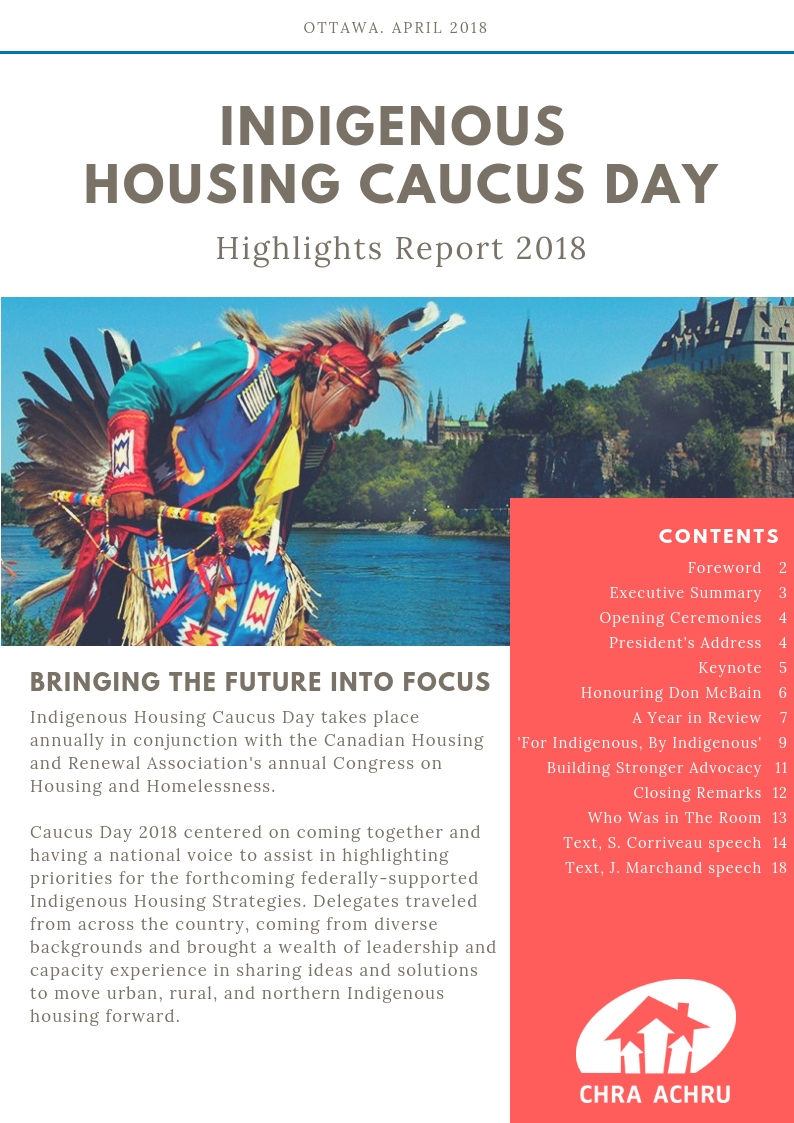 |
|---|
| Download the PDF version |
Bringing the Future into Focus
The Canadian Housing and Renewal Association’s (CHRA) Indigenous Housing Caucus was established in 2013 at CHRA’s annual Congress on Housing and Homelessness in recognition of the large number of Indigenous-led and Indigenous-serving organisations who are CHRA members and wanted to work together for better housing for First Nation, Métis, and Inuit people living in northern, rural, and urban areas. Indigenous housing and homelessness service providers across the country face a number of challenges to which the Indigenous Caucus is responding with resourcefulness, good management and innovation.
Indigenous Housing Caucus Day takes place annually in conjunction with CHRA’s Congress on Housing and Homelessness. It is a full-day collaborative forum attended by over 150 delegates from across Canada, ranging from urban and regional social and non-profit Indigenous housing corporations, local homelessness service providers and regional homelessness coordinators, representatives of all orders of government, and private sector actors in academia and business.
Since 2013, the Indigenous Caucus has grown both in size and influence, becoming a credible body for developing and providing Indigenous policy advice on housing and homelessness. The Indigenous Caucus meets together in person once a year at Caucus Day. Throughout the remainder of the year the interests, feedback, advice, and recommendations communicated on Caucus Day is represented and actioned by CHRA’s Indigenous Housing Caucus Working Group. The Working Group assembles via monthly conference calls to advise and provide Indigenous perspectives on emerging national housing and homelessness issues to CHRA, as well as provide advocacy support and propose research projects exploring various facets of Indigenous housing and homelessness issues.
The Working Group is composed of CHRA members from across the country with an expertise and understanding of Indigenous housing, including tenant support, building operations, cultural issues, and homelessness. Robert Byers, President and CEO of Namerind Housing Corporation in Regina, has served as Indigenous Communities Director on the CHRA Board of Directors, and as Chair of the CHRA Indigenous Housing Caucus since 2013.
Executive Summary
Founded in 1968, CHRA celebrated its 50th annual Congress on Housing and Homelessness in April 2018 in Ottawa. In a second milestone, the CHRA’s Indigenous Caucus celebrated its 5th Annual Indigenous Housing Caucus Day themed on ‘Bringing the Future into Focus.’
In November 2017 the Government of Canada released a National Housing Strategy with one large, glaring omission. After discussions with Indigenous leaders and organisations, the federal government decided to co-develop federally-supported distinctions-based First Nations, Inuit and Métis housing strategies founded in principles of self-determination, reconciliation, respect, and co-operation.
The federal government is looking to unveil these Indigenous housing strategies sometime in 2018-2019. And while the distinctions-based strategies will undoubtedly be touted as a positive step toward reconciliation with Indigenous people, the strategies will be ineffective and the reconciliation process half-hearted if the government neglects to include the knowledge and expertise of urban, rural and northern Indigenous housing providers.
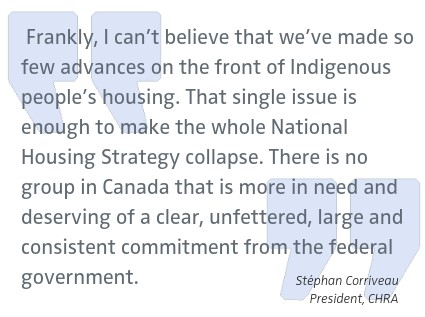 Aimed at addressing specific gaps in the National Housing Strategy, Indigenous Caucus Day 2018 sessions were divided into three key themes: the past, the present, and the future.
Aimed at addressing specific gaps in the National Housing Strategy, Indigenous Caucus Day 2018 sessions were divided into three key themes: the past, the present, and the future.
Session One – A Year in Review – laid the groundwork for the day by providing an overview of the activities and initiatives undertaken by CHRA and the Indigenous Housing Caucus Working Group since Caucus Day 2017 in Halifax.
Session Two welcomed panelists from the Department of Indigenous Services Canada and the Assembly of First Nations to discuss the process to date on the federally-supported co-development of the Indigenous Housing Strategies. CHRA’s Indigenous Caucus Working Group proposed a “For Indigenous, By Indigenous: National Housing Strategy” – a bold new framework for advancing urban, rural, and northern Indigenous housing. In facilitated interactive discussion groups, Caucus Day delegates provided their thoughts and feedback into the proposal.
Finally, Session Three looked to the not so distant future at the upcoming 2019 federal election and asked, “What can we do to ensure Indigenous housing is an election priority? How do we effectively engage both political representatives and civil society?” Once again Caucus Day delegates assembled into small interactive discussion groups to provide thoughts on how to keep government implicated and accountable amid other competing policy priorities and evolving political mandates.
Opening Ceremonies
Caucus Day 2018 was chaired by Indigenous Caucus Working Group member Richard George, who warmly welcomed delegates and set the tone for the presentations and activities for the day. Richard spoke to the importance of continued engagement and participation with the Indigenous Caucus as a vehicle to amplify the collective voice of the urban, rural, and northern Indigenous housing organisations and tenants they serve.
The Indigenous Caucus was honoured to have Elder Claudette Commanda provide an opening prayer and acknowledge the land on which the Caucus gathered is the traditional and unceded territory of the Algonquin Nation.
President’s Address
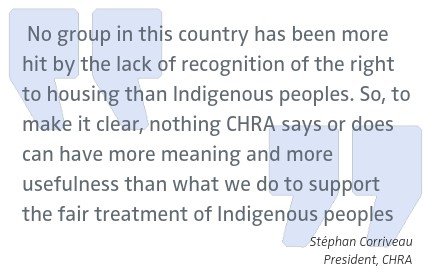 In an eloquent and moving opening address (pdf), CHRA President Stéphan Corriveau welcomed delegates and stood firm that Indigenous issues and Indigenous voices are central in the Association’s political and organisational agendas.
In an eloquent and moving opening address (pdf), CHRA President Stéphan Corriveau welcomed delegates and stood firm that Indigenous issues and Indigenous voices are central in the Association’s political and organisational agendas.
In supporting its push for an urban, rural and northern Indigenous housing Strategy, CHRA instituted several measures in 2017-2018 to strengthen its Indigenous mandate, such as hiring a permanent staff member to coordinate Caucus initiatives and ensuring meetings with political representatives include an agenda item devoted specifically to Indigenous housing. In 2018, the CHRA Board of Directors agreed to dedicate funding to support the Caucus and its activities, and in 2018-19, representation of Indigenous housing providers on CHRA’s Board has increased with additional Board members from the Caucus. In addition to Robert Byers and Stéphan Corriveau, Pamela Hine, Margaret Pfoh, and Susan McGee from the Indigenous Caucus Working Group sit on CHRA’s 2018-2019 Board of Directors. While not a member of the Indigenous Housing Caucus Working Group, Kevin Albers, CEO of M’akola Housing Society and M’akola Development Services, is an Indigenous housing provider in BC and sits on the Board of Directors.
Keynote
 As was reflected in Caucus Day’s theme “Bringing the Future into Focus”, delegates welcomed keynote remarks from Adam Vaughan, Parliamentary Secretary to the Minister of Families, Children and Social Development – Housing and Urban Affairs.
As was reflected in Caucus Day’s theme “Bringing the Future into Focus”, delegates welcomed keynote remarks from Adam Vaughan, Parliamentary Secretary to the Minister of Families, Children and Social Development – Housing and Urban Affairs.
Mr. Vaughan spoke to his career and experiences working in housing prior to entering municipal and federal politics and the awesome responsibility and challenge governments have ensuring all Canadians have access to secure, safe, and affordable housing. Reiterating that no relationship is more important to the Government than the one with Indigenous peoples and the need to be better at engaging and consulting with Indigenous communities, he applauded the work of the Indigenous Caucus and the much-needed space it creates in giving a voice to Indigenous housing providers.
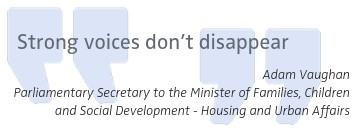 Mr. Vaughan drew on the importance of aligning housing to the spirit and intent of the Truth and Reconciliation’s final report. This includes holding government to account and being honest as a country about the legacy of displacing Indigenous people and the current opportunities to bring about meaningful change. Otherwise, he feared, reconciliation would fail, housing programs would fail, and ultimately, Canada would fail to meet the challenge of providing for its most disadvantaged and vulnerable peoples.
Mr. Vaughan drew on the importance of aligning housing to the spirit and intent of the Truth and Reconciliation’s final report. This includes holding government to account and being honest as a country about the legacy of displacing Indigenous people and the current opportunities to bring about meaningful change. Otherwise, he feared, reconciliation would fail, housing programs would fail, and ultimately, Canada would fail to meet the challenge of providing for its most disadvantaged and vulnerable peoples.
True to the words that he spoke Mr. Vaughan remained in attendance for the duration of Caucus Day, taking the time to speak with delegates about the issues that they faced as housing and services providers.
Honouring Don McBain
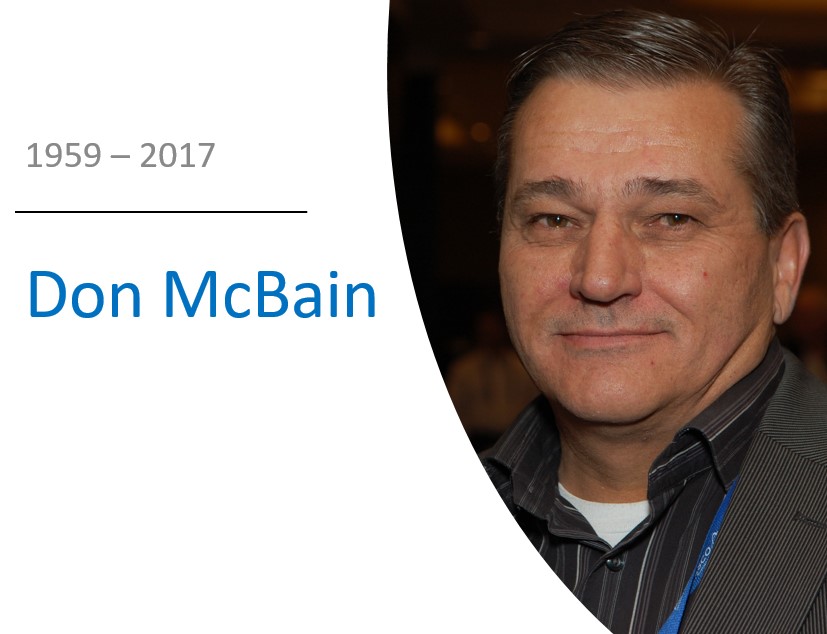 Strong partnerships and friendships have developed among delegates over the years and Caucus Day also serves to highlight the achievements of Indigenous housing providers. With profound sadness and fond memories, delegates honoured Don McBain, a friend and colleague who passed away in the fall of 2017. Don’s wife Sandra, and their children Rory and Sarah, as well as Sandra’s brother Rick Arnill, his wife Sandy, and their daughter Jamie attended the ceremony. Gathered together, an honour song for Don was played by the Ottawa River drum group and Sandra was wrapped in a star blanket.
Strong partnerships and friendships have developed among delegates over the years and Caucus Day also serves to highlight the achievements of Indigenous housing providers. With profound sadness and fond memories, delegates honoured Don McBain, a friend and colleague who passed away in the fall of 2017. Don’s wife Sandra, and their children Rory and Sarah, as well as Sandra’s brother Rick Arnill, his wife Sandy, and their daughter Jamie attended the ceremony. Gathered together, an honour song for Don was played by the Ottawa River drum group and Sandra was wrapped in a star blanket.
Justin Marchand, having assumed the role of Executive Director of the Ontario Aboriginal Housing Service (OAHS) after Don’s passing, spoke of his friend and mentor with great respect. The Caucus itself was initiated with the help of Don and other like-minded Indigenous housing providers and continues to stand as a testament to what Don called ‘coming together’.
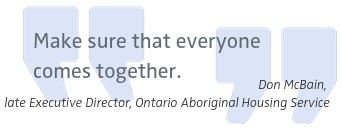 Don was a visionary and champion of Indigenous housing. He recognized that housing was the foundation that provided a better future for individuals and families and allowed them to fully contribute to society and community. Don worked for decades to gain Indigenous control over Indigenous resources because he recognized the need to create housing for Indigenous people in a culturally appropriate way. He founded OAHS in 1994 as a means of transferring control of Indigenous housing from the province of Ontario to Indigenous people. Since that time, OAHS has become one of the largest urban and rural Indigenous housing providers in the country and plays a leadership role across Canada promoting Indigenous housing and ending Indigenous homelessness.
Don was a visionary and champion of Indigenous housing. He recognized that housing was the foundation that provided a better future for individuals and families and allowed them to fully contribute to society and community. Don worked for decades to gain Indigenous control over Indigenous resources because he recognized the need to create housing for Indigenous people in a culturally appropriate way. He founded OAHS in 1994 as a means of transferring control of Indigenous housing from the province of Ontario to Indigenous people. Since that time, OAHS has become one of the largest urban and rural Indigenous housing providers in the country and plays a leadership role across Canada promoting Indigenous housing and ending Indigenous homelessness.
Don believed that strong partnerships and coming together, was critical in addressing Indigenous homelessness and housing. In that spirit, the Indigenous Caucus and OAHS stand as Don’s legacy. For his work Don was posthumously awarded CHRA’s Lifetime Achievement Award.
Session One: A Year in Review
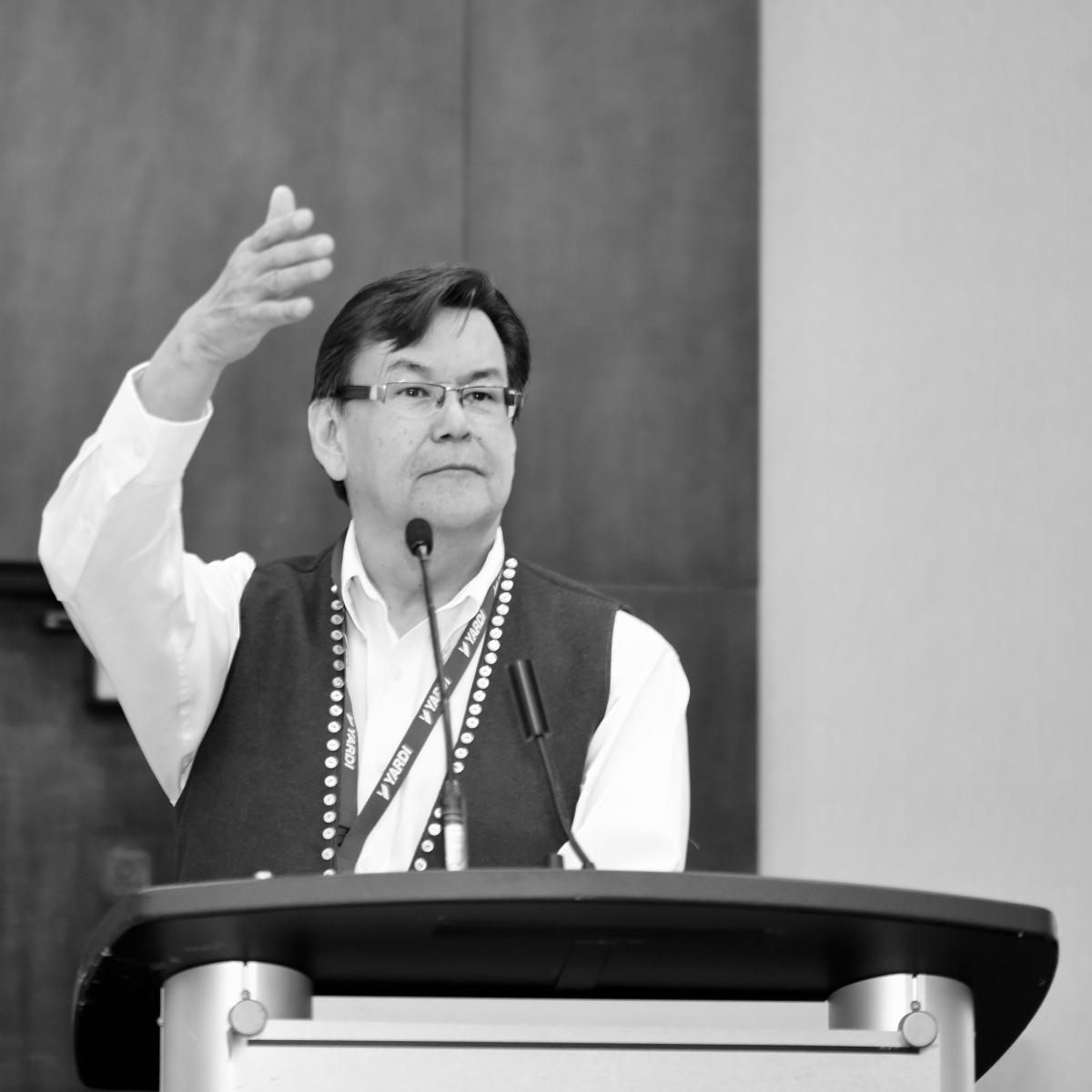 2017-2018 was particularly eventful for CHRA’s Indigenous Caucus Working Group. Members of the Working Group are not only advocates in their own jurisdictions – the municipalities and provinces and Indigenous communities they live and work in – but equal champions on the national stage for Indigenous inclusion, respect for rights and self-determination, and predicable and just commitment to resources. Working Group members were invited to be a part of briefings with Ministers and senior decision makers at various levels of government, focusing advocacy on the inclusion of an urban, rural and northern Indigenous housing strategy as part of the overall National Housing Strategy. Working Group members Justin Marchand and Richard George provided a brief year in review.
2017-2018 was particularly eventful for CHRA’s Indigenous Caucus Working Group. Members of the Working Group are not only advocates in their own jurisdictions – the municipalities and provinces and Indigenous communities they live and work in – but equal champions on the national stage for Indigenous inclusion, respect for rights and self-determination, and predicable and just commitment to resources. Working Group members were invited to be a part of briefings with Ministers and senior decision makers at various levels of government, focusing advocacy on the inclusion of an urban, rural and northern Indigenous housing strategy as part of the overall National Housing Strategy. Working Group members Justin Marchand and Richard George provided a brief year in review.
In June 2017, the discussions and input gathered at Caucus Day 2017 in Halifax (pdf) were used to develop a policy paper (pdf) containing a series of recommendations for an urban, rural, and northern Indigenous Housing Strategy. The contents of the policy paper were widely distributed and communicated to politicians and senior government representatives, including as part of CHRA’s annual Housing on the Hill Day in October 2017.
Hill Day is an opportunity for CHRA members to engage with Members of Parliament to seek out support, raise awareness, and set the stage for additional investments in housing. The nearly 60 participants were provided with affirmative speaking notes, a two-page infographic brief on Indigenous housing in Canada, and a copy of the policy paper in their participant packages to be delivered to the over 30 Parliamentarians who took part in Hill Day 2017.
The day prior to Hill Day, CHRA, along with Leilani Farha, the United Nations Special Rapporteur on the Right to Housing, and other leading anti-poverty, housing, and homelessness advocates, held a joint press conference (pdf) on Parliament Hill to call on the Federal Government to adopt a rights-based approach for the National Housing Strategy and Poverty Reduction Strategies.
CHRA’s Board President Stéphan Corriveau spoke passionately about the need for the federal government to implement, properly fund, and continually update housing priorities and stated that, “A legislative guarantee of a National Housing Strategy and an Indigenous Housing Strategy referencing Canada’s human rights obligations would be one tool to ensure ongoing, continuous funding for housing for Canada’s most vulnerable populations”.
After the initial release of the National Housing Strategy in November 2017, it was confirmed that the federal government would be co-developing three distinctions-based housing strategies for First Nations, Métis and Inuit communities, with dedicated funding for their development to be later committed via federal Budget 2018.
In 2017, Prime Minister Trudeau dissolved INAC – the Department of Indigenous and Northern Affairs Canada – and in its place established two new departments: The Department of Indigenous Services led by Minister Jane Philpott, and the Department of Crown-Indigenous Relations led by Minister Carolyn Bennett.
The Department of Indigenous Services is officially leading the co-development of the three distinctions-based strategies and the Indigenous Caucus Working Group met twice in early 2018 with the Department and other federal representatives, as well as representatives from the Assembly of First Nations and the Inuit Tapiriit Kanatami.
The purpose of the meetings was to communicate the Caucus’ demand for an urban, rural and northern Indigenous Housing Strategy to be included in the consultation and development process, and to discuss the Caucus’ proposals for its content, as outlined in the June 2017 policy paper.
Shortly before Caucus Day 2018, the Working Group met in Vancouver for a two-day in-person strategic planning session. This meeting was set in motion following funding support from CHRA’s Board of Directors and other Indigenous housing organisations. The meeting’s objective was to update the June 2017 policy paper containing recommendations for an urban, rural, and northern Indigenous Housing Strategy and develop a proposal paper to be put to federal representatives that outline “For Indigenous, By Indigenous” housing priorities.
A letter was also addressed to Minister Philpott written by the Working Group concerned that the needs and interests of urban, rural, and northern Indigenous housing tenants and providers were being excluded from the consultation and development process of the Indigenous housing strategies and sought the Government of Canada’s commitment to a dedicated urban, rural and northern Indigenous housing strategy.
To keep up the pressure on the Government of Canada to develop this dedicated strategy, an ad was published in the parliamentary newspaper the Hill Times.
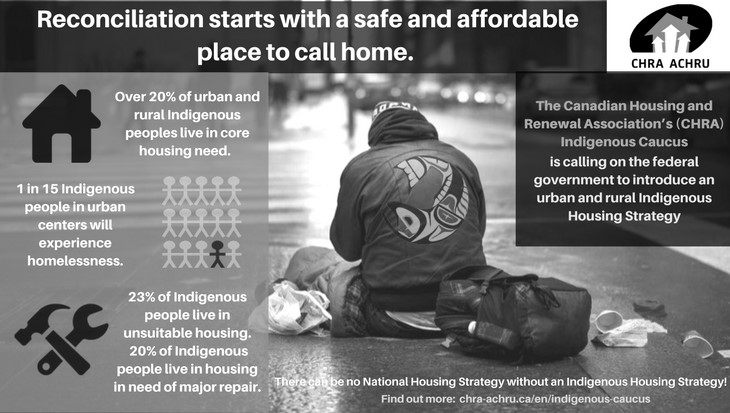 |
All in all, the Indigenous Caucus Working Group remains a dedicated body within CHRA, as a centre of expertise with significant practical and political capacity and knowledge mandated to advance Indigenous housing and homelessness issues across Canada. Working Group members do not undertake their work lightly, nor do they work in a vacuum. Caucus Day discussions and input are used throughout the year to set the agenda and initiatives of the Working Group and Caucus Day delegates remain at the forefront of achievements in building stronger, healthy and sustainable Indigenous communities.
Session Two: A ‘For Indigenous, By Indigenous’ National Housing Strategy
Caucus Day 2018 was centered on the development of an Indigenous housing strategy. Presentations (pdf) and the interactive discussion session that followed focused the opportunity to include Indigenous housing interests under the broader umbrella of the federal National Housing Strategy. It is the position of CHRA and the Indigenous Caucus Working Group that there cannot be a true National Housing Strategy without the inclusion of an Indigenous Housing Strategy. It was to this outcome that panelists spoke.
Lillian Hopkins, Senior Director of Housing for the Department of Indigenous Services Canada, and Tammy Cote, Senior Policy Analyst of Housing for the Assembly of First Nations, provided context and background on the progress of the distinctions-based Indigenous housing strategies.
Ms. Hopkins outlined the initial work being undertaken in collaboration with various federal departments and agencies and Indigenous groups to advance the distinctions-based strategies, including federal Budget 2018 investments in support of these strategies. The Department of Indigenous Services will continue to engage with Indigenous groups with the overall objective of completing the strategies and improving the housing conditions of Indigenous peoples living across Canada.
Ms. Cote updated delegates on the First Nations’ housing and infrastructure strategy. She acknowledged that all First Nations members living on or away from their communities have a right to shelter and must be provided with an opportunity to access safe, secure, adequate and affordable housing. The Assembly of First Nations is working toward options for First Nations care and control of housing and infrastructure, including funding intended for housing flowing directly to First Nations communities, and ultimately removing the Department of Indigenous Services and the Canada Mortgage and Housing Corporation from providing First Nations housing and infrastructure.
The last panel presentation shifted toward addressing gaps in the current distinctions-based strategies to discuss urban, rural, and northern Indigenous housing. On behalf of the Indigenous Caucus Working Group, Marc Maracle and Christin Swim presented to delegates a proposed a For Indigenous, By Indigenous” (FIBI) National Housing Strategy (PDF). The draft framework updates the June 2017 policy paper recommendations and serves as a policy outline containing objectives and specific measures that should form the basis of a fourth Indigenous housing strategy for urban, rural, and northern Indigenous peoples.
For the last 45 years, a national network of over 100 social and non-profit Indigenous housing organisations have provided affordable and social housing by taking a service-based rather than a distinctions-based approach – meaning that urban, rural and northern Indigenous housing organisations do not distinguish between First Nations, Inuit or Métis persons when providing housing or services to those in need. As the Government of Canada works with First Nations, Inuit and Métis to develop the three distinctions-based Indigenous housing strategies, the FIBI paper calls on the government to financially support a fourth strategy that addresses the distinct housing needs of urban, rural and northern Indigenous peoples.
The FIBI paper proposes several program elements to protect and expand the existing stock of Indigenous housing, as well as establish a governance body that would serve as a sector capacity resource through data collection, research and evaluation to enhanced evidence-based decision making on program design and provision of housing and services.
Following the panel presentations delegates were divided into discussion groups, each with a group lead and notetaker, and asked to express their views and share ideas and priorities on the proposed FIBI strategy. Delegates also had the opportunity to hear input and summary remarks from all the discussion groups during a plenary session presented by group leads.
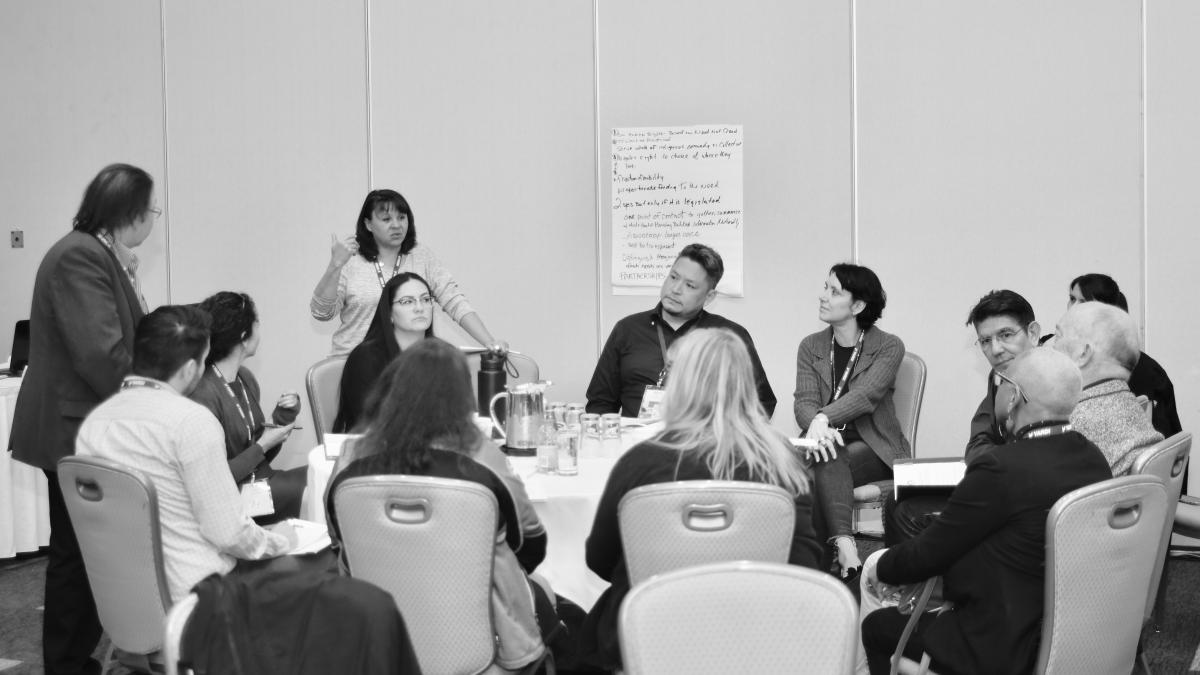 |
 |
Overall, delegates supported the FIBI proposal and reiterated the need for a distinct urban, rural, and northern Indigenous housing strategy. Caucus delegates expressed concern and frustration with the status quo. Many did not feel recognized or empowered with the three distinction-based strategies and felt left out of the decision-making process, with little to no outreach or engagement from either the distinctions-based groups or the federal government. Delegates conveyed their unease that housing needs of urban, rural, and northern Indigenous peoples would not be adequately addressed within the framework of the distinctions-based strategies and the expertise and capacities of the organisations currently providing services to this population was being overlooked.
The three distinction-based strategies were regarded by some delegates as an attempt by the Government of Canada to divide and conquer. As one delegate noted, “do not divide us! – whether First Nation, Métis, Inuit, we are all one!”
Delegates provided insight, advice and direction on moving forward with the FIBI strategy and detailed notes were taken throughout the interactive session. The Indigenous Caucus Working Group closed the session by outlining their plan to amend the draft FIBI strategy with the input gathered at Caucus Day before engaging with and presenting a finalised version to federal officials.
Session Three: Building Stronger Advocacy
The final session of Caucus Day 2018 looked to the future on how to engage Indigenous people during the 2019 federal election process. The brief panel presentation by Indigenous Caucus Working Group members Marc Maracle and Susan McGee was a creative, uplifting and hopeful examination of ways in which to bring change to the status quo through advocacy and civic engagement.
 Various strategies and means of communicating key election messages included generating interest and awareness through a greater social media presence and broadening network scope to include organisations outside of housing and homelessness; meeting, either as an individual or as a housing or service provider, with Members of Parliament and election candidates; organising town halls, letter writing or postcard campaigns; and, engaging with housing organisations, like CHRA or provincial non-profit housing associations, to ensure that housing provider membership is heard and reflected in advocacy mandates.
Various strategies and means of communicating key election messages included generating interest and awareness through a greater social media presence and broadening network scope to include organisations outside of housing and homelessness; meeting, either as an individual or as a housing or service provider, with Members of Parliament and election candidates; organising town halls, letter writing or postcard campaigns; and, engaging with housing organisations, like CHRA or provincial non-profit housing associations, to ensure that housing provider membership is heard and reflected in advocacy mandates.
Two CHRA activities where the Indigenous Caucus could be directly involved in broader advocacy campaigns were highlighted:
First, the Indigenous Caucus Working Group would be bringing forward a Resolution in support of an urban, rural, and northern Indigenous housing strategy at CHRA’s Annual General Meeting. The Resolution calls on the Government of Canada to develop a strategy that would set forth an objective of raising the standard of Indigenous housing to that of non-Indigenous Canadians within the next 10 years. Individuals and organisations were encouraged to officially endorse the Resolution and add their name to the growing list of support for urban, rural and northern Indigenous housing.
Second, every autumn, CHRA hosts a ‘Housing on the Hill Day’ where leaders in the affordable housing and homelessness sectors meet one-on-one with Members of Parliament and Senators. In an effort to raise awareness and build long-term political support, the day promotes networking and advocacy on housing and homelessness issues to help inform electoral positions. Caucus Day delegates were again encouraged to be involved and participate in Hill Day 2018.
Following the panel presentation, delegates broke into groups to express their views and share ideas, including lessons learned, best practices, and useful tactics, on how best to develop and build momentum for successful advocacy campaigns. Delegates were firm in asserting that it is not enough to be aspirational, but to be prescriptive.
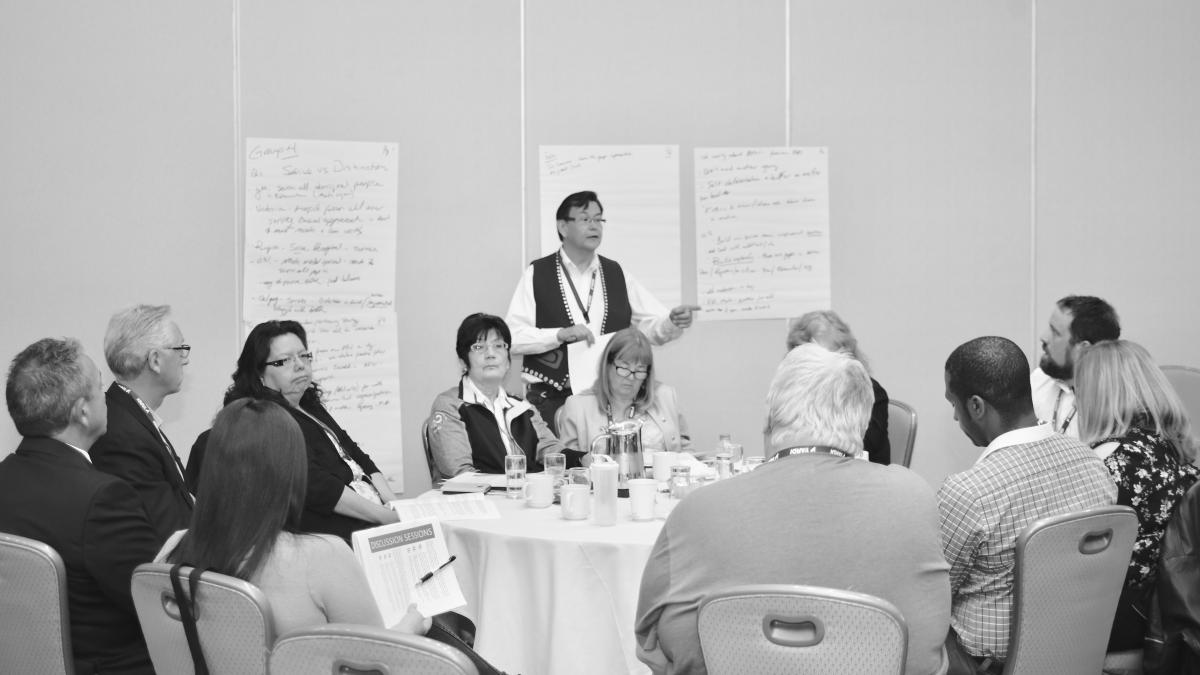 Delegates provided suggestions on building awareness and driving support for an urban, rural, and northern Indigenous housing strategy. The ideas shared throughout the interactive session were captured by notetakers to be used to help structure CHRA and the Indigenous Caucus Work Group’s workplan for the coming year ahead of the release of the Indigenous Housing Strategies and federal election 2019. Priority issues areas included highlighting housing as a means of reconciliation, the right to housing, understanding data gaps, and better communications in sharing information and research.
Delegates provided suggestions on building awareness and driving support for an urban, rural, and northern Indigenous housing strategy. The ideas shared throughout the interactive session were captured by notetakers to be used to help structure CHRA and the Indigenous Caucus Work Group’s workplan for the coming year ahead of the release of the Indigenous Housing Strategies and federal election 2019. Priority issues areas included highlighting housing as a means of reconciliation, the right to housing, understanding data gaps, and better communications in sharing information and research.
Finally, tools that would be useful to organisations and agencies at the local level to advance issues and concerns pertaining to the inclusion of urban, rural, and northern Indigenous issues in broader policy strategies were discussed, such as the need to include, and not just speak on behalf of, the tenants served by Indigenous housing providers. One interesting dynamic that was mentioned by several groups focused on taking control over messaging to better shift the narrative of Indigenous social policy away from the negative. Statistics and data often paint a grim picture of the living conditions of Indigenous peoples, but housing providers would like to see more inspirational stories and messages that highlight the strength and resilience of individuals and communities in the face of systemic barriers.
Closing Remarks
Richard George and Elder Claudette Commanda provided the closing remarks and prayer for Caucus Day 2018.
Housing forms the foundation for vibrant Indigenous communities, and a robust Indigenous housing strategy should include a view of housing as an integral part of the reconciliation process. This is a watershed moment and a federal commitment to an urban, rural, and northern Indigenous Housing Strategy continues to be a meaningful advocacy objective for CHRA and the Indigenous Caucus. Delegates were pleased and encouraged to note that federal representatives from several departments, including Indigenous Services Canada and the Canada Mortgage and Housing Corporations, were in attendance to observe Caucus Day 2018. The hope was that their take away and debrief to colleagues and executive policy and decision makers highlight the importance of this Caucus as a voice for urban, rural, and northern Indigenous housing and homelessness issues.
Caucus Day always brings to light the excellent work being done across Canada to support the wellbeing of Indigenous people. In this exchange of ideas, partnerships are developed inside and outside the affordable housing and homelessness sector and going forward the Indigenous Caucus will need partners more than ever to ensure that urban, rural and northern Indigenous voices are heard – not just in the housing sector, but all in areas needed to build strong communities.
Who Was in the Room
With representation from all territories and 8 provinces, Caucus Day 2018 brought together 152 delegates in total – an increase of 17% over the previous year. Approximately three-quarters of Caucus Day participants are CHRA members.
The increase in participation was particularly gratifying considering the distances traveled by so many to attend. Maintaining and enhancing the momentum of the Indigenous Caucus itself and of Caucus Day speaks to the great interest, importance and timeliness of Indigenous housing issues. It is also a testament to the hard work and determination of those involved with Indigenous housing across Canada, and the strong advocacy from the CHRA Board, staff and the CHRA Indigenous Caucus Working Group.
The diversity of geography and experience of delegates added richness to the panel presentations, the interactive discussion sessions and delegates’ policy recommendations. In terms of sectors represented, delegates can be broken down as follows:
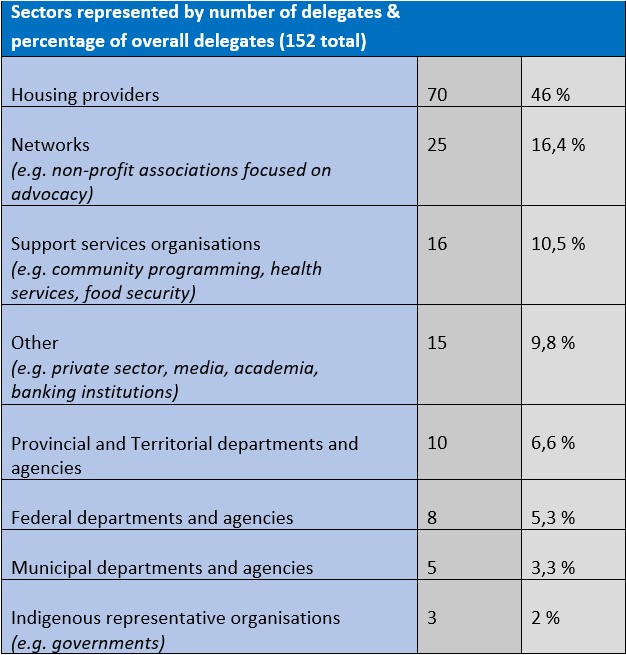 |
